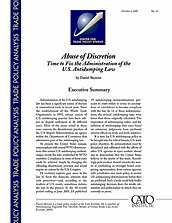At present, the United States remains noncompliant with several WTO determinations that certain U.S. antidumping methodologies violate the rules established by WTO members. Compliance in some of those cases could be achieved simply by changing the offending discretionary practices and would require no actions by the U.S. Congress.
IA routinely exploits gray areas in the law to favor the domestic interests that seek protection–and, according to the verdicts of U.S. courts, sometimes violates the law in the process. In the 18-month period ending in June 2005, IA published 19 antidumping redeterminations pursuant to court orders to revise its assumptions or calculations to become compliant with the law. In 14 of those redeterminations, the revised antidumping rates were lower than those originally calculated. The imposition of antidumping orders and the inflation of antidumping duty rates based on erroneous judgments have profound adverse effects on trade and trade relations.
It is time for U.S. antidumping policy to be brought into the fold of broader U.S. trade policy objectives. Its administration must be disciplined and calibrated with the efforts of other U.S. agencies to open markets abroad and to demonstrate that the United States believes in the merits of free trade. Accordingly, policymakers should consider the merits of establishing an oversight board, comprising representatives from various agencies with jurisdiction over trade policy, to review IA’s antidumping determinations before they are published. Such a body could help buffer antidumping decisions from the results orientation and politicization to which they are currently so prone.


